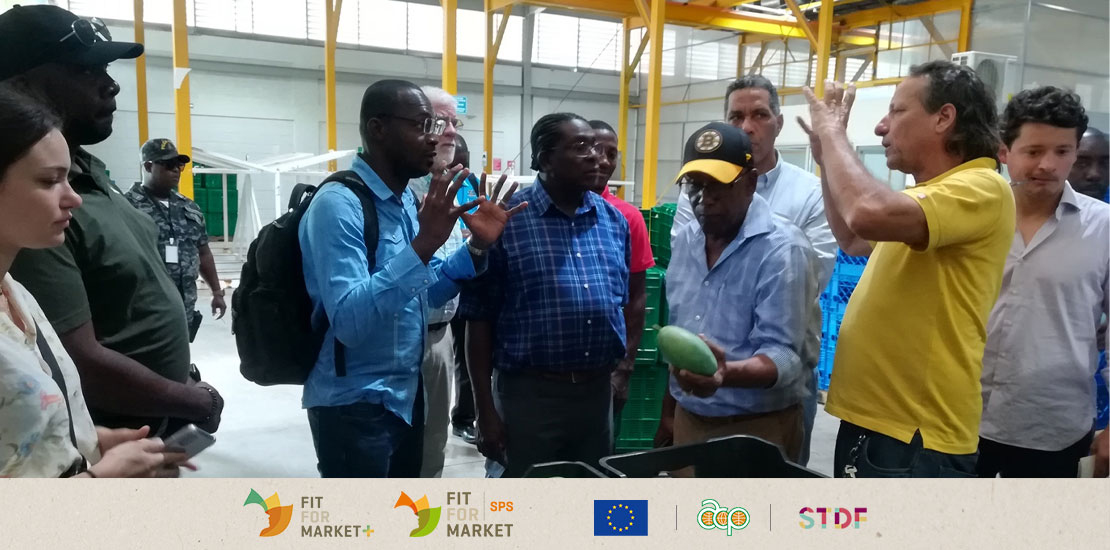Three missions to meet with our partners and collaborators
- 13/07/2022
- Posted by: Gaetan Dermien
- Category: Burundi, Caribbean, Dominican Republic, Guinea, News

Guinea
Several meetings were organised with the Direction Nationale de la Protection des Végétaux et des Denrées Stockées (DNPV-DS) of the Ministry of Agriculture in Guinea. Planned capacity building activities (training in sampling and performing official controls) were discussed, as well as possibilities for the establishment of an internal training unit within Guinea’s National Plant Protection Organisation (NPPO).
The STDF project in Guinea began in 2019 with the aim to strengthen phytosanitary capacity in Guinea, contributing to the establishment of a monitoring, control, inspection and phytosanitary certification system in the potato and mango sectors, in accordance with international standards on phytosanitary measures and the requirements of the WTO–SPS Agreement. The steering committee meeting in Conakry was attended virtually by the STDF representative in Geneva, and in person by representatives of the DNPV-DS, as well as the National Committee for the Control of Fruit Flies and Other Mango Pests, and local producers. A proposal to extend the project for a further 6 months was validated during the meeting.
A visit to the EU Delegation in Conakry gave COLEACP an opportunity to present their activities in Guinea, including the EU-funded Pineapple Sector Revival Project (REFILA). COLEACP has been selected by UNIDO as a partner to provide technical assistance and training services for this project. SPS issues were also discussed, specifically those related to European phytosanitary regulations for mango and the challenges these represent for ACP countries. The EU Delegation was also informed about our new programmes Fit For Market+ and AGRINFO.
COLEACP met with several other programmes and structures active in the mango, pineapple and potato sectors. Following discussions with the SyRIMAO project (monitoring fruit fly in the Economic Community of West African States), COLEACP launched the development of a Good Practice Guide for mango in West Africa under the Fit For Market SPS programme. The mission in Guinea offered the opportunity to meet with the national stakeholders involved in its development. Another Good Practice Guide, for the potato sector in Guinea, is under development. A workshop was also held during the visit to present the results of a field survey to the Technical Working Group, and a work plan was drawn up for further activities and collaboration.
Since this mission, progress has been made in developing a list of harmful organisms for Guinea, validated during a recent workshop; and in implementing a Phytophthora blight (P. infestans) surveillance system for the potato sector.
Burundi
COLEACP Regional Programme Coordinator Bénédicte Werner visited Burundi in April 2022 to assess the impacts of support activities conducted through the Fit for Market SPS programme and to organise future actions. Meetings were held with partner-beneficiary organisations and MINEAGRIE (Ministère de l’Environnement, de l’Agriculture et de l’Elevage), as well as discussions with new operators to assess the needs and identify further expertise in Burundi. Burundian stakeholders were notified of the operational launch of the Fit for Market+ programme.
The Director General of Agriculture, along with two agents of the Direction de la Protection des Végétaux, as part of the SPS expert group, met with COLEACP at the MINEAGRIE offices in Bujumbura. The meetings gave an opportunity to review digital tools and training developed by COLEACP for the NPPO, in the framework of the Fit for Market SPS programme. The representative also discussed the imminent start of an SPS diagnostic mission, financed by STDF under a project preparation grant. The aim of the diagnostic mission is to conduct an assessment of the SPS system using the R-SAT (Rapid SPS Assessment Tool), with a view to developing a project proposal to address and prioritise identified SPS capacity building needs. A further meeting was held with the Minister of Environment, Agriculture and Livestock, to review the government’s priorities for the promotion of agriculture.
Leaders of the IPFB, representing 74 organisations and groups in the horticultural value chain (fruit, vegetables, flowers and, more recently, agro-cosmetics), talked with COLEACP about current activities including the application to STDF for diagnosis of the SPS system (see below); the regional MARKUP programme focusing on the avocado sector; an agricultural production mapping project; and the organisation of various fairs and exhibitions in Burundi.
The COLEACP representative had a working meeting with the NGO ADISCO which supports fruit production and processing cooperatives. Several capacity building activities have taken place through the Fit for Market and Fit for Market SPS programmes (both on site and digitally), and two technical training courses are planned for 2022 for ADISCO supervisors, on topics related to contracting, fruit and vegetable processing, and marketing. The training will include supervisors from UHACOM (a Burundian organisation comprising 33 cooperatives).
Separate discussions were held with the Deputy Chief of Staff of the President of the Repubic of Burundi, the Minister of Trade, and several companies active in production, processing and marketing of fruit and vegetables. COLEACP’s activities in the horticulture sector, both regarding exports and to meet the needs of the local market (fresh consumption and processing of perishable products) through the Fit for Market SPS programme were presented. The talks focused on the need to improve production while addressing constraints linked to the marketing of products.
Exchanges with BOAM, with the Chamber of Agribusiness, and with the Federal Chamber of Commerce also took place to identify other agri-food companies and experts who could become involved in the Fit For Market+ programme.
Dominican Republic
A COLEACP team – Marie-Hélène Kestemont (Lead Expert SPS), Soline Malburet (Project Officer) and Thomas Lopes (Senior Project Manager) – visited the Dominican Republic in June to strengthen our activities through the Fit For Market SPS programme. The team participated in the technical section of the EXPO MANGO in Bani (Dominican Today, 8 June) to give presentations related to COLEACP’s work on mango (market analysis and research/innovation) and to introduce the new Fit For Market+ programme. The presentations highlighted SPS issues, in particular the work developed by COLEACP to contribute to a better management of pests and diseases (mainly anthracnose and fruit flies).
The COLEACP team met with organisations active in the SPS field (IDB, JAD, IDIAF) and the Ministry of Agriculture to discuss the strengthening of the SPS system and the function of laboratories in the Dominican Republic. The team is also working to coordinate with other projects (e.g. the IESC’s TRASA project) to identify specific needs not yet covered by existing programmes.
COLEACP has a programme of trials in the Dominican Republic, including residue trials and an efficacy trial of plant protection products (PPPs) for the control of thrips in aubergine. Non-compliance with EU SPS requirements (maximum residue limits, MRLs, for pesticides) is hampering exports of aubergine (Solanum melongena). It is essential to provide producers with solutions compatible with integrated pest management that enable thrip-free crops, respecting EU MRLs. COLEACP met the service providers in charge of testing PPPs, and visited the plots where trials will be carried out.
The COLEACP team and a national representative met current and potential partners of the in-country programmes, to evaluate requests for support and develop a list of priority actions. An action plan was developed with the NPPO in 2020 to improve the national SPS system, and now needs to be updated.
The EU Delegation in Santo Domingo was updated on COLEACP activities through the Fit For Market SPS and Fit For Market+ programmes.
The Fit For Market+ and Fit For Market SPS programmes are implemented by COLEACP within the Framework of Development Cooperation between the Organisation of African, Caribbean and Pacific States (OACPS) and the European Union. The project “Strengthening the phytosanitary monitoring and certification system in Guinea” is supported by the Standards and Trade Development Facility (STDF) and implemented by COLEACP.

